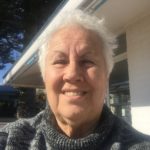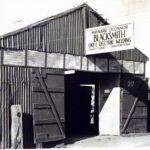Time has passed for Joseph Dangerfield 1, my great-great grandfather, and It is just two short years since he and and his good friend Edward Cooper arrived at Port Adelaide in South Australia as crew on the ship ‘Santipore.’ Today is a very different scene from that furtive night in 1848 when the two friends “skipped ship” at Port Adelaide and disappeared into the night. Today is a happy occasion and there are no policemen waiting to arrest him for disorderly behavior, or for being a runaway seaman.
This day, the 27th June, 1850, is to be his wedding day. The day he is to marry his sweetheart, 17 year-old Sarah Elliott of McLaren Vale, at the beautiful St Stephen’s Church at Willunga.
In order to witness this auspicious occasion, I, Fay O’Connor, great-great granddaughter of Joseph and Sarah, have transported myself in my imagination back to the 27th June, 1850 from my year, 2012, to witness Joseph and Sarah’s marriage first hand.
 “Lovely day for a wedding isn’t it?,” I said to the middle aged lady who was standing nearby and also waiting for the bridal party to arrive.
“Lovely day for a wedding isn’t it?,” I said to the middle aged lady who was standing nearby and also waiting for the bridal party to arrive.
“Yes, indeed it is,” she replied, turning towards me. She is an attractive woman and is wearing (to me) an old-fashioned blue gown with white gloves and a blue poke-bonnet. She has been watching me curiously for some time now. This does not surprise me since I must surely be the only stranger among all those present here today. A balmy sea breeze is ruffling my long skirt and bright sunshine warms my face. It is indeed a lovely day and certainly a perfect day for a wedding. It is the 27th June 1850 and I am here to attend the wedding of Joseph Dangerfield and Sarah Elliott at St Stephens Church. St Stephens is the great marrying place of the south because it is the only Church south of St Marys, Sturt. The Rev Arthur Burnett is the ‘surrogate’ for the districts of Willunga, Noarlunga, Port Elliott, Goolwa and Yankalilla and he will be performing the ceremony today.
“May I ask, are you a friend of the bride or the groom?” asked my new acquaintance.
 “I’m sorry, I should have introduced myself. My name is Fay O’Connor and I am a friend of the groom. We met a short time after he first arrived in Adelaide from England.”
“I’m sorry, I should have introduced myself. My name is Fay O’Connor and I am a friend of the groom. We met a short time after he first arrived in Adelaide from England.”
“I am indeed pleased to meet you. My name is Judith Cooper, and this is my husband William. We are very close friends of both the groom and the bride, in fact we are virtually family to them.” It is a surprisingly warm day for the month of June and we are all standing in the cool shade of a tall gum tree. Above us the wide expanse of azure-blue sky seems to stretch forever, and a gentle, slightly salty sea-breeze fans our cheeks coming as it does from the ocean which is only a few miles away. A semi-circle of brown bare hills arcs around behind the church and magpies chortle above us.
Judith’s husband stepped forward and shook my hand and greeted me. “How do you do?”
“I am well, thanks,” I replied. “Have you known Joseph and Sarah for long?”
 “Oh yes. We come from the Parish of Wimbottham in the County of Norfolk in England and the Dangerfields were friends of our family in the old country. Sarah’s family is from McLaren Vale and are well-known in the area. Joseph doesn’t have family in Australia and so we are here as his representatives and we have helped the Elliott’s to organize the wedding.”
“Oh yes. We come from the Parish of Wimbottham in the County of Norfolk in England and the Dangerfields were friends of our family in the old country. Sarah’s family is from McLaren Vale and are well-known in the area. Joseph doesn’t have family in Australia and so we are here as his representatives and we have helped the Elliott’s to organize the wedding.”
“I am sure they are very grateful for your support.”
“That they are,” said William.
“And when did you emigrate to Australia, William?” I asked.
“We came out in the ‘Marmion’ a year ago now. Joseph’s groomsman in the wedding is our nephew Edward Cooper. Edward and Joseph came out together on the ‘Santipore,’ in 1848.
“Was there a reason why you didn’t all come out together on the ‘Santipore?’ I queried.
“We intended to come out at the same time and on the same ship as Joseph and Edward, but it turned out that we didn’t qualify under the Wakefield scheme so had to come out one year later. We were very disappointed at the time but in the end it probably worked out better for us all because it gave Joseph and Edward time to become settled before we arrived and then they were able to help us to become established,” said Judith.
“And are these your children?” I asked gesturing towards a group of young boys and girls playing nearby.
“Yes, these are our children. The boy on the left is William, then Thomas, George, Joel, Jane, John, Robert and James. Our eldest daughter Elizabeth is to be Sarah’s maid of honor.”
“That’s lovely, but won’t you need to be seated in the Church before the wedding party arrives?” I asked.
“Yes, we will, but the children wanted to see Sarah when she arrives, so we will only go into the church at the last minute,” said Judith.
“Oh, I see.”
William turned to me with a frown furrowing his forehead. “I tell Judith that Sarah at 17 years of age is too young to be getting married, but Judith doesn’t agree. What do you think?” William asked me.
“Oh William, don’t let’s go into that again,” said Judith “the banns have been called and everything is legal and properly in place for the wedding, so there is no turning back now,” laughed Judith, “and besides, Joseph’s maturity will make up for any immaturity that Sarah may have.”
 “Oh look, here she comes now,’” squealed Judith’s young daughter Jane, jumping up and down with excitement. A carriage came to a halt in front of the church. It was a smart two-seater with an open top and high spoked wheels. It was drawn by a pretty white horse decorated for the occasion with ribbons intertwined into its mane. William was there to help Sarah down from the carriage. He kissed her lightly on the cheek. The maid-of-honor, Judith and William’s daughter Elizabeth, stepped down, laughing and smiling. What a pretty, eager young girl she was, so happy and high-spirited. I was very interested in Sarah’s gown. It was made of fine lace with a fitted bodice and sleeves and a full skirt with a long veil edged with delicate white flowers. Sarah’s hair was looped back from a central part ending in a spray of curls beneath the veil. How pretty she was! But I agreed with William, she was such a child!
“Oh look, here she comes now,’” squealed Judith’s young daughter Jane, jumping up and down with excitement. A carriage came to a halt in front of the church. It was a smart two-seater with an open top and high spoked wheels. It was drawn by a pretty white horse decorated for the occasion with ribbons intertwined into its mane. William was there to help Sarah down from the carriage. He kissed her lightly on the cheek. The maid-of-honor, Judith and William’s daughter Elizabeth, stepped down, laughing and smiling. What a pretty, eager young girl she was, so happy and high-spirited. I was very interested in Sarah’s gown. It was made of fine lace with a fitted bodice and sleeves and a full skirt with a long veil edged with delicate white flowers. Sarah’s hair was looped back from a central part ending in a spray of curls beneath the veil. How pretty she was! But I agreed with William, she was such a child!
“We must go in now,” said Judith, “come children. Perhaps you would like to sit with us, Miss O’Connor, there is a spare seat in our pew?” offered Judith.
“Oh yes, I would love to. Indeed, thank you.” We walked down the aisle to the front of the Church and sat in the very front pew. The high ceiling of the church arched above our heads and in front of the altar the rays of the sun shone through the stained glass windows giving the whole church a muted glow. The Rev Burnett stood before the altar as William walked Sarah up to stand next to Joseph and Edward Cooper. Elizabeth then stood beside Sarah. In a deep and sonorous voice the Rev Burnett began to intone the traditional wedding ceremony. Watching Joseph I noted how very tall and slim he was. He wore a dark gray single-breasted suit with tails, a white high-collared shirt, a white vest and a white bow tie. His hair he wore long and again I noticed it was reddish, a sandy color. He had a mustache and a short trimmed beard with long sideburns. I thought he was very handsome. The wedding was a modest but uplifting ceremony, not much different from those I have attended in my own day. Each person played the role allotted him or her until at last Joseph was asked to provide a ring and place it on his bride’s finger. He did this lovingly, gazing into his bride’s eyes. Then the Reverend Burnett pronounced the two as man and wife and Joseph bent and kissed Sarah gently on the lips. And so it was that my great-great-grandfather and my great-great grandmother were married and my future birth some 89 years later was assured!
The small wedding party then departed to a side room for the signing of the registry. In the interim, one of Judith’s and William’s daughters sang a solo whilst the couple signed the registration documents.
 The organist then launched into a resounding rendering of the old hymn ‘Joy comes,’ and the bride and groom walked towards our pew and hugged and kissed William and Judith. When Sarah and Joseph came to where I was standing, Sarah smiled and kissed me on the cheek. “Thank you for coming,” she said. It took a moment for Joseph to recognize me from when we had met in the Adelaide Jail, but when he did, he nodded and leaned over and kissed me on the cheek.
The organist then launched into a resounding rendering of the old hymn ‘Joy comes,’ and the bride and groom walked towards our pew and hugged and kissed William and Judith. When Sarah and Joseph came to where I was standing, Sarah smiled and kissed me on the cheek. “Thank you for coming,” she said. It took a moment for Joseph to recognize me from when we had met in the Adelaide Jail, but when he did, he nodded and leaned over and kissed me on the cheek.
“We do meet again, as you said we would, Miss O’Connor, you will attend our reception won’t you?” he queried.
“Yes, she will Joseph, we have already invited her.” Said Judith. Joseph nodded and the pair passed on down the aisle, greeting and kissing everyone as they passed. The reception was held in an adjoining sandstone building where there was a large room prepared with a number of Tressel tables heaped with food and drink. And the food, the food was divine; country women are such very good cooks! Judith sat with me throughout the reception and we had the opportunity for a chat.
“Could you tell me a little about your life in England and your reasons for coming to Australia,” I asked.
“Yes, if you like. I was born in Norfolk England on the 20th April 1800. My family name was Langford. Both William and I were about 49 years of age when we emigrated. We had recently lost two of our children, Recabine and Judith and were very sad about that. Times were hard in England and everyone was talking about the opportunities in Australia. We felt like a fresh start and Australia was described as a ‘Land of Promise’ and William wanted to live in a warmer climate. So, we gathered up our surviving children and here we are. We left in November 1848 and arrived at Port Adelaide on 13th February 1849.”
“And how has it all worked out for you?” I asked.
“Well we are looking for land to establish a farm. We have considered land at McLaren Vale and also in the District Council of Highercoombe. We have to look for something that we can afford. In the meantime we are living with Joseph on his property at McLaren Vale. We will help him work his land and then maybe in a year or two we can buy a property of our own.”
“I am sure you will find something suitable,” I said. In fact I was very sure that they would find a suitable property because from my research in 2012, I knew that William and Judith would take up 80 acres of land with a house on Section 1564 in the District Council of Highercoobme. From the early survey maps I had looked at, this land was somewhere in the area now at the back of the present day Modbury Hotel, the area generally known as the Upper Dry Creek. I knew that they would lease from a Mr A McLaine. The annual value of the land would be would be assessed at 50 pounds and Judith and William would pay 21 pounds in Council Rates. Later they would take up another 244 acres in sections 1583, 1582 and 2121 which would be good arable land with a full value of 233 pounds and rated for 141.13 pounds. In 1858 the district of Highercoobme would be divided and the land would become part of the District Council of Tea Tree Gully. For the first few years the family would stay at home and help work the farm and in later years, all the Cooper children would eventually become farmers, mostly in the lower and mid north areas of the state. As for Joseph and Sarah Dangerfield, they would continue to farm for some years in the McLaren Vale area, but later would move to the northern part of the State to the Rochester and Kadina areas. Their children would be Henry, Charles, Joseph (my great-grandfather), James, Albert, Edward, Thomas, Ellen, Annie Rose and Bert.
I wondered whether my great-great-grandfather Joseph would ever think about me and our two meetings after I returned back to my own home and time.












